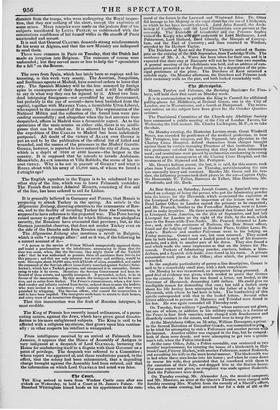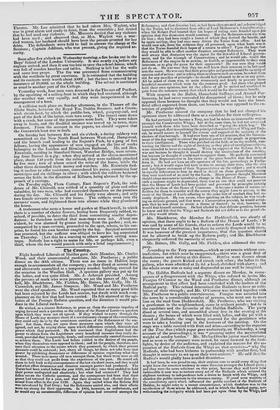At Bow Street, on Saturday, Joseph Gomez, a Spaniard, was
examined on a charge of being the person who put the fulminating powder into the letters for the Havannah, which occasioned the explosion at the Liverpool Post-office. An inspection of the letters sent to the Dead Letter Office in London caused the prisoner to be suspected ; and Mr. Peacock, brother to the Post-office Solicitor, went to Liverpool to make inquiries. He there ascertained that Gomez had arrived at Liverpool, from America, on the 21st of September, and had left Liverpool for London on the night of the 2.5th, by the mail, which goes to the Swan-with-Two-Necks. Mr. Peacock returned to London ; and, with the assistance of Ruthven, the Bow Street officer, found out the lodging of Gomez in Benbow Place, Golden Lane, St. Luke's. Ruthven and another Policeman went to his lodging on Friday morning. Gomez was out, but soon returned. They seized him by both hands ; and found a loaded pistol in each of his trouserspockets, and a dirk in another part of his dress. They also found a seal which made the same impression as that on the letters for Havannah. Packets of fulminating powder, crackers, bullets, a blunderbuss, and a Spanish dirk-knife, were found in his room. A private examination took place at the Office; after which, the prisoner was remanded.
In the emphatic particularity of penny-a.line description, Gomez is said to be a remarkably small man, with a dark complexion. On Monday he was reexamined, an interpreter being procured. A good deal of evidence was given, which tended to prove that Gomez was the criminal. In his box was found a letter, not loaded, to the Governor of Havannab, demanding 1.500 dollars. He could give no intelligible reason for demanding that sum ; but told a foolish story about his life having been attempted by the father of a lady in the Havannah, with whom he had been in love. The handwriting of this epistle corresponded with that in the loaded letters. Several other letters addressed to persons in Matanzas and Trinidad were found in his box. He was again remanded till Thursday next.
On Tuesday, four military "gentlemen," whose names are not given, but one of whom, in addition to his military capacity, is a Justice of the Peace in four Irish counties, were charged with drunkenness and disorderly conduct in the streets, and bound over to keep the peace.
At the Marylebone Office, on Menday, William Davenport, a privet in the Second Battalion of Grenadier Guards, was committed to pri46 to be tried for attempting to stub a Policeman and another person with his bayonet. Another soldier was engaged in the fray, but he escaped: both of them were drunk, and were attempting to get into a gentleman's cab, when the Police interfered. At the same Office, Jolly, a Police constable, was sentenced to two months' imprisonment, for entering the house of a blacksmith in Holbrook Court, Fitzroy Market,:with another Policeman, named Roderick, and assaulting his wife in the most brutal manner. The blacksmith was in bed when these men broke into his house; and when he came down to rescue his wife, they pretended that he interfered with them in the execution of their duty, and dragged him to the Station. house. For some reason not given, no complaint was made against Roderick. Both the Policemen were drunk.
On Tuesday evening, Mr. Alexander Lee, the musical composer, and Mr. Manvers, an actor at the Queen's Theatre, were charged with forcibly rescuing Mrs. Waylett from the custody of a Sheriff's officer, who, on the same evening, bad arrested her for a debt of 40/. at the
Theatre. Mr. Lee admitted that he had taken Mrs. Waylett, who was in great alarm and ready to faint, from the constable ; but denied that he had used any violence. Mr. Manvers dented that any violence had been used ; and observed that, as Mrs. Waylett was a married woman, her husband should have been the person arrested for her debts. The defendants were held to bail to answer the charge at the Sessions; Captain Addison, who was present, giving the required se
curity.



























 Previous page
Previous page